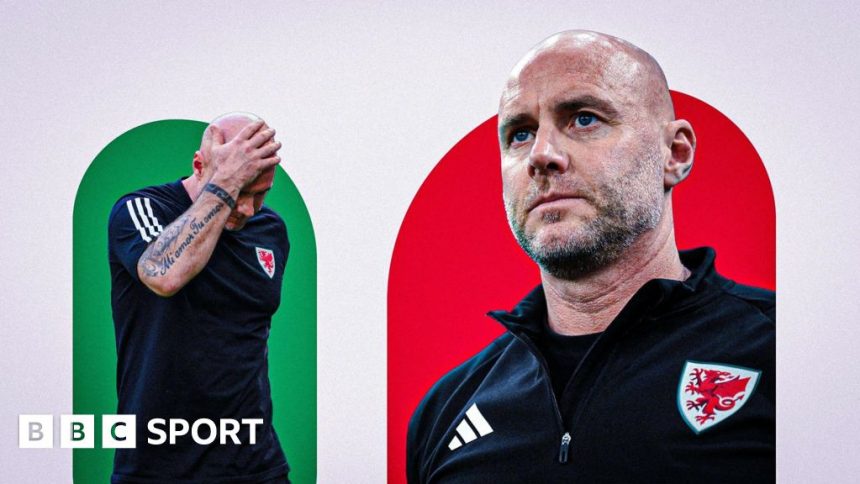The inside story of Page’s rise and fall as Wales boss

Rob Page’s reign as Wales boss came despite him leading the team to a World Cup
-
Published
It might seem strange to ask where it all went wrong for the Wales manager who led his country to a first World Cup finals since 1958.
Two years ago, Rob Page raised his clenched fists to the skies as summer rain soaked a heaving, disbelieving Cardiff City Stadium; an abiding image of Wales’ momentous play-off win against Ukraine.
Amid the emotional outpouring of a nation, Page represented an endearing sub-plot as the unlikely figurehead to this most cathartic of triumphs.
History will show that Page was in charge for half of Wales’ first four appearances at major tournaments – some achievement considering his only previous senior managerial roles had been in League One.
In light of that, some may view his departure as unfortunate, a harsh reminder of the volatile nature of a manager’s lot.
But while Page will be remembered fondly for much of his reign, once you dig deeper, the reasons for his departure become clearer.
He leaves a mixed legacy. There was fleeting success at Euro 2020 and pure euphoria in reaching the 2022 World Cup, yet his tenure also took Wales to the depths of an embarrassing home defeat by Armenia and subsequent failure to qualify for Euro 2024.
The combined misery of this month’s dismal friendlies against Gibraltar and Slovakia proved to be the final straw as Wales’ fans turned on Page, with boos, vitriol and calls for him to be sacked.
Now they have their wish, with Football Association of Wales (FAW) bosses eventually deciding that a change was needed – a sorry end to a historic reign of highs and lows.
A proud Welshman thrust into the limelight
In the early stages, Page openly admitted he never expected to land this job.
A proud Rhondda man who earned 41 Wales caps as a centre-back, Page was a familiar figure after a playing career spent with clubs such as Watford, Sheffield United and Cardiff City.
His coaching CV was unremarkable. Following spells at Port Vale and Northampton Town, Page spent two years as Wales Under-21 boss before he was added to Ryan Giggs’ senior backroom staff in 2019.
Then, when Giggs stepped aside amid off-field issues in November 2020, Page took over as caretaker manager.
Aware that this might only be a temporary measure, Page sought continuity and made only the slightest “sympathetic changes” to the team. His approach worked well, building on Giggs’ strong start to secure promotion to the Nations League’s top flight.
Giggs, who had led Wales to Euro 2020 qualification, remained absent when the coronavirus-delayed tournament eventually took place in 2021, leaving Page in charge.
The players were happy enough. Although Page’s coaching credentials were limited, he was popular with the squad, particularly those who had played under him for the under-21s.
Wales were fortunate to draw their opening match with Switzerland, but an excellent 2-0 win over Turkey was enough to see them reach the knockout stages despite losing their final group game to Italy.
The second-round encounter with Denmark proved a step too far for Wales and their manager. They started quite brightly but, once Danish boss Kasper Hjulmand made a tactical tweak and moved defender Andreas Christensen into midfield, Page could not respond and the consequences were dire as Wales were hammered 4-0.
Historic glory, then dismal failure
Wales’ players and staff thank fans after their 2022 World Cup elimination
That thrashing by Denmark in Amsterdam raised concerns, but FAW bosses were broadly satisfied with the job Page was doing under difficult circumstances.
Besides, the FAW was not in a position to make a permanent managerial change while Giggs’ future remained uncertain. Giggs would later be cleared of allegations he assaulted his ex-girlfriend and her sister.
The FAW was in a state of flux between the departure of chief executive Jonathan Ford and the arrival of his successor Noel Mooney.
Page remained in post for a 2022 World Cup qualifying campaign in which Wales stumbled at times, trailing in Belarus before Gareth Bale spared their blushes with a match-winning hat-trick and then drawing at home to Estonia.
Bale proved Wales’ saviour once more in the play-offs, scoring all three goals as Wales defeated Austria and Ukraine to reach their first World Cup for 64 years.
Page got the job on a permanent basis and, three months after that seismic – if somewhat fortuitous – win over Ukraine, he signed a new four-year contract.
Wales’ play-off success may have masked some indifferent performances – those wins were their only two from 12 matches in 2022 – but the luck ran out in Qatar.
Page was criticised for his tactics in the opening draw with the United States and, despite saying “lessons had been learned” after salvaging a point, he made the same mistakes as Wales were comprehensively outplayed in a 2-0 defeat by Iran.
If the grumbles of discontent were getting louder after that shambolic display, they were clearer still after a timid 3-0 loss to England sealed Wales’ fate.
Chief executive Mooney said in the aftermath that the FAW had “complete confidence” in Page, who was just three months into a new four-year deal.
But Wales’ short stay in Qatar had not been a happy one. There was disquiet behind the scenes, while the footballing preparations left some unimpressed as Wales’ undercooked players misfired.
Page was safe but something had to change. His assistant coach Kit Symons departed the following month.
Later in January 2023, Bale announced his retirement from football, the surest sign yet that this was the beginning of the end for Wales’ golden generation.
When Joe Allen called time on his Wales career a month later, and then Chris Gunter did the same in March, Page needed to start anew.
-
-
Published10 January 2023
-
Things fall apart
Backed by the FAW to lead Wales into Euro 2024 qualifying, Page oversaw a promising start with a draw in Croatia and victory over Latvia in March 2023.
But three months later, things fell apart.
The humiliating 4-2 defeat at home to Armenia was one of the worst results in Welsh football history, with Page’s disjointed and naively open team outplayed by a side 71 places below them in the world rankings.
Fierce criticism followed and, after Page described the result as a “slap” his team might have needed, fans and pundits only became angrier.
Still the FAW stuck by their man, though there was growing unease about Wales’ performance levels and the damage that the Armenia result, coupled with defeat in Turkey three days later, could do to their hopes of qualifying for Euro 2024.
In September, assistant coach Eric Ramsay became the latest to leave Page’s staff having only been in the role for six months.
Page admitted the Armenia result “haunted” him but struck a defiant tone in a BBC Sport Wales interview in which he took “full responsibility” for that debacle and said he had the FAW’s support.
That was true for many – but not all – people at the governing body.
As for the fans, while they remained supportive to their team inside the stadium, their calls for Page to be sacked were becoming deafening online.
It was assumed by some that the FAW’s refusal to fire Page was because they could not afford the pay-off with three years left on his contract – but that was not the case.
Doing so there and then would have cost the same amount as firing Page closer to the end of his four-year deal, as stipulated when he signed it before the World Cup.
Some at the FAW were reluctant to change manager in the middle of a campaign, pointing to Page’s previous achievements and his popularity among the players.
There was also the consideration that the FAW’s relatively modest budget would limit their options when it came to choosing a successor.
The speculation around Page’s future intensified in October when Mooney said the manager would have to keep winning games to keep his job, comments which vice-captain Ben Davies described as “unhelpful”.
Wales’ players responded with a stirring 2-1 win over Croatia, after which Davies and Connor Roberts were pictured making ‘zip it’ gestures in an apparent reference to Mooney’s comments, and Page was close to tears in his post-match conference as he said he was “sick and tired” of talking about his future.
The tension between Page and Mooney was evident and, although honest talks in the week after the Croatia game healed their relationship, the situation was far from harmonious.
A demoralising end
Robert Page: The highs and lows of sacked manager’s Wales era
Wales’ victory over Croatia had put their destiny back in their own hands – beat Armenia and Turkey in November and they would qualify automatically for Euro 2024.
However, they squandered that opportunity with two draws, putting Page back under pressure.
Thanks to the Nations League, Wales still had another chance of qualifying via the play-offs – but they wasted that reprieve as well as they lost their final on penalties to Poland in March.
Just a day later, FAW president Steve Williams publicly declared that Page would keep his job.
The timing of the statement was as surprising as its contents for others at the association.
Usually, the FAW takes its time over the internal reviews that follow each international window, consulting the association’s international game board and figures such as chief football officer Dave Adams before reaching a conclusion. That is why it took more than a week before Page eventually departed.
After Williams’ swift declaration of support, Page’s next assignment was a training camp in Portugal followed by friendly matches against Gibraltar and Slovakia.
He selected a young and experimental team to face Gibraltar on the Algarve, expecting to make light work of a team ranked 207th in the world and comprised largely of part-time players.
But the embarrassing goalless draw in Faro prompted boos from the travelling Wales fans in Faro, some of whom chanted “We want Page out” as he made his way down the tunnel.
Wales’ supporters had not turned on a manager for decades, and the fury only intensified when a more experienced Wales side were thrashed 4-0 in Slovakia three days later.
After sarcastic chants of “in transition” – referencing Page’s repeated calls for patience – and more calls for the manager’s sacking, fans jeered him again in Trnava, this time louder and angrier.
Page is usually bullish after defeats, insisting his side are building for the future and that he will not be deterred by criticism.
But on this occasion, he was crestfallen. He admitted fans “want me out” and that he understood why, adding he felt “low” and that any decision about his future was out of his hands.
The way Page spoke in Trnava, he seemed to think his time was up.
The FAW reverted to its customary, more patient approach, with senior figures making no official comment and instead saying they would carry out the reviews as usual.
Days passed with no news, leading some to wonder if Page might get another reprieve.
And while it is true he still had his backers at the FAW, the majority believed it was time for a change.
Twelve days after the trouncing in Slovakia seemed to signal the end for Page. The FAW’s decision-makers eventually concluded their talks on Friday morning and agreed on a course of action.
Official confirmation followed and, just like that, attention turned to identifying a successor.
As Page, the man who took Wales to a first World Cup for half a century, can attest, football moves on quickly.
Related Topics
-
-
Published5 hours ago
-
-
-
Published9 June
-






